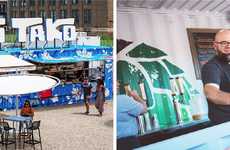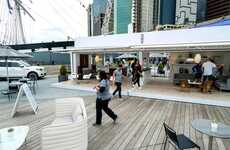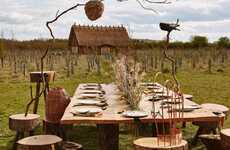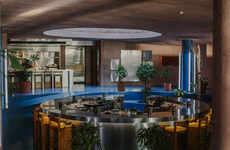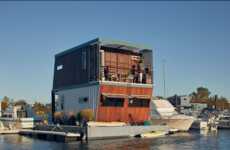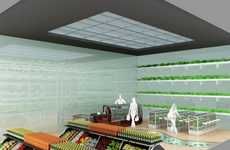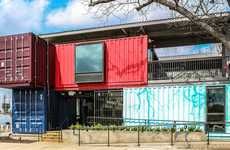
Les Grandes Tables Offers an Eco-Friendly Dining Experience
Katherinev123 — December 28, 2011 — Eco
References: 1024architecture.net & designbuzz
Designed by Jean Nouvel of 1024 Architecture, Les Grandes Tables is a restaurant made from salvaged shipping containers. Only one part of a bigger entertainment center -- which will include hotels, cinemas, art studios, museums and more -- Les Grandes Tables is located on Seguin Island in Western Paris.
Les Grandes Tables boasts a list of eco-friendly design elements. The industrial containers have been strategically placed so as to maximize light and air, and it features a frame made of timber that is also encased in glass. With a first-floor restaurant and a bottom ground level reserved for parties and events, the building is also flanked by a greenhouse and a garden, which will provide the restaurant with fresh vegetables.
Les Grandes Tables boasts a list of eco-friendly design elements. The industrial containers have been strategically placed so as to maximize light and air, and it features a frame made of timber that is also encased in glass. With a first-floor restaurant and a bottom ground level reserved for parties and events, the building is also flanked by a greenhouse and a garden, which will provide the restaurant with fresh vegetables.
Trend Themes
1. Eco-friendly Architecture - The trend of using salvaged shipping containers and sustainable design elements in architecture presents disruptive innovation opportunities for the construction industry.
2. Urban Entertainment Centers - The rise of entertainment centers that incorporate multiple attractions, such as hotels, cinemas, art studios, and museums, provides disruptive innovation opportunities in the entertainment and hospitality industries.
3. Vertical Farming - The integration of greenhouses and gardens in urban buildings, like Les Grandes Tables, highlights the potential for disruptive innovation in the agriculture industry through vertical farming solutions.
Industry Implications
1. Construction - The use of salvaged shipping containers and sustainable design elements in architecture opens up disruptive innovation opportunities for the construction industry.
2. Hospitality - The integration of hotels, restaurants, and entertainment facilities in urban centers creates disruptive innovation opportunities for the hospitality industry.
3. Agriculture - The incorporation of greenhouses and gardens in urban buildings presents disruptive innovation opportunities for the agriculture industry through urban farming and vertical farming techniques.
6.7
Score
Popularity
Activity
Freshness


